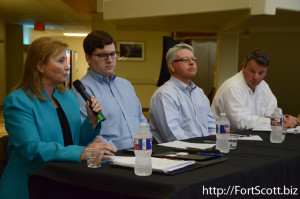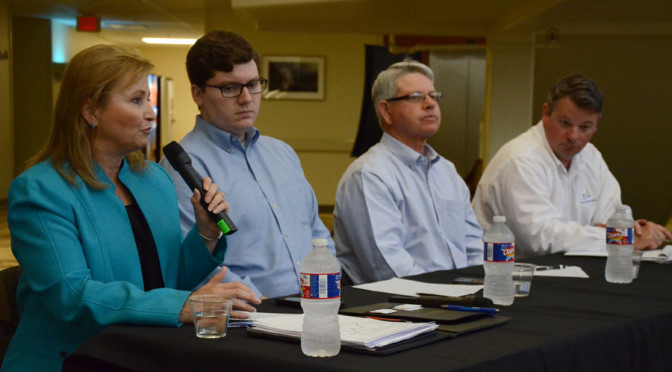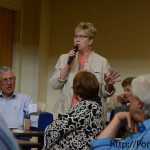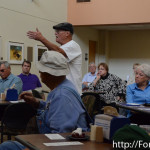During a legislative breakfast hosted at Mercy Hospital Saturday morning, two state senators and two state representatives answered questions from members of the Fort Scott community on a number of topics.

“I’m always glad to come up here and participate in this forum,” Representative Adam Lusker said.
With Mark McCoy serving as moderator, the politicians answered questions from the floor as well as questions and comments that had been emailed in advance. Topics ranged from slot machines at dog and horse racing tracks to energy rates and state resources, but much of the time was spent discussing a property tax lid and state education funding.
The panel, which included Lusker with Rep. Marty Read, Sen. Jake LaTurner and Sen. Caryn Tyson, discussed a bill which ould allow property tax rates to be voted on by the citizens if the city or county leaders decide to increase the rates beyond that allowed by inflation and other exemptions.
The panelists pointed out that such a change would grant more rights to the citizens while making the market more competitive in bringing landowners and businesses to the county and the state, since Missouri rates are consistently lower than those in Kansas.
City and county leaders in attendance at the breakfast panel expressed their disagreement with the proposal since it would add restrictions on the leaders voted in by the citizens to represent them, and whom the citizens could vote out of office if they do not properly represent them. Another comment from the audience pointed out that such a change would force the community to pay for an election.
“I don’t think it ties their hands at all,” LaTurner said of the proposed bill and how it affects elected officials, while Tyson said it will help prevent high rates, such as agricultural property rates that went up an average of 15 percent in Bourbon County this year and as much as 40 percent in other areas.
Another key topic, referred to as the second elephant in the room, was education and house bills that have raised concerns for those involved in the schools.
One area concerned a senate bill passed in 2012 that provided a reimbursement for high school students completing technical college courses and even a $1,000 incentive to the students’ high schools. However, that incentive has been taken away as the budget decreases from more than $1 million to about $50,000 in the 2016-2017 year, only covering the testing done during the college courses.
Tyson explained the larger budget and incentives had been designed to only be temporary as the program kicked off. Area educators expressed their concern at that fact as area schools and colleges strive to start up such a program but need that financial support.
The panelists also discussed Kansas House bill 2741, which would prevent state education funding from being used for administrative, maintenance, construction, repairs, extra-curricular activities and food service costs. Tyson and LaTurner both pointed out this bill has not had a hearing yet and they doubt it will advance any further.
Tyson also pointed out that education funding from the state was last cut in 2009 and has only increased from there, although its distribution has left some areas with cuts.
City Manager Dave Martin expressed his appreciation to the four panelists for their representation of Bourbon County and for being willing to speak and work with local leaders, despite any differences in opinion.
All four encouraged residents in their districts to contact them with any questions, comments or concerns they might have on state or local issues.



